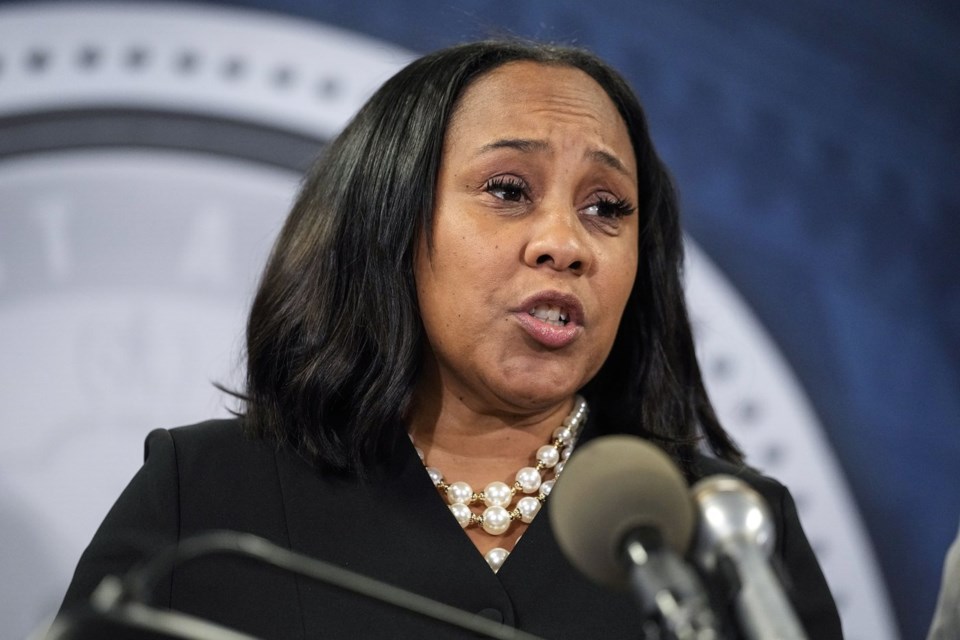ATLANTA (AP) — A state appeals court on Thursday removed Fulton County District Attorney Fani Willis from the Georgia election interference case against Donald Trump and others, the latest legal victory for the president-elect in criminal cases that once threatened his career and freedom.
The case against Trump and more than a dozen others had already been stalled for months over an appeal related to a romantic relationship Willis had with special prosecutor Nathan Wade, whom she had hired to lead the case.
Citing an “appearance of impropriety” that might not typically warrant such a removal, a Georgia Court of Appeals panel said in a 2-1 ruling that “this is the rare case in which disqualification is mandated and no other remedy will suffice to restore public confidence in the integrity of these proceedings.” Willis’ office immediately filed a notice of intent to ask the Georgia Supreme Court to review the decision.
But pursuing a criminal case against a sitting president is a virtual impossibility. And Trump will return to the White House having overcome efforts to prosecute him and empowered by a Supreme Court ruling granting him presumptive immunity for any “official acts” he takes in office.
The development comes weeks after Justice Department special counsel Jack Smith abandoned two federal prosecutions against the incoming president, and as sentencing in a separate hush money case in New York is indefinitely on hold as a result of Trump’s victory in November over Democratic Vice President Kamala Harris.
A grand jury in Atlanta indicted Trump and 18 others in August 2023, using the state’s anti-racketeering law to accuse them of participating in a wide-ranging scheme to illegally try to overturn Trump’s narrow 2020 presidential election loss to Democrat Joe Biden in Georgia. The alleged scheme included Trump's call to Georgia Secretary of State Brad Raffensperger urging him to help find enough votes to beat Biden. Four people have pleaded guilty.
Trump told Fox News Digital that the case “should not be allowed to go any further.” The president-elect added: “Everybody should receive an apology, including those wonderful patriots who have been caught up in this for years.”
Steve Sadow, Trump’s lead attorney in Georgia, said the ruling was “well-reasoned and just.” He said the appeals court “highlighted that Willis’ misconduct created an ‘odor of mendacity’ and an appearance of impropriety that could only be cured by the disqualification of her and her entire office.”
“This decision puts an end to a politically motivated persecution of the next President of the United States,” Sadow wrote in an emailed statement.
Representatives for Willis did not immediately respond to a text message seeking comment on the ruling.
The allegations that Willis had improperly benefited from her romance with Wade resulted in a tumultuous couple of months in the case as intimate details of Willis and Wade’s personal lives were aired in court in mid-February. A defendant's motion alleged that Willis and Wade were involved in an inappropriate romantic relationship and that Willis paid Wade large sums for his work and then benefited when he paid for lavish vacations.
Willis and Wade acknowledged the relationship but said they didn’t begin dating until the spring of 2022. Wade was hired in November 2021, and their romance ended in the summer of 2023, they said. They also testified that they split travel and other costs roughly evenly, with Willis often paying expenses or reimbursing Wade in cash.
Speaking at a historically Black church in Atlanta soon after the relationship allegations surfaced, Willis defended Wade’s qualifications and her own leadership of her office. Defense lawyers said that speech included a series of improper and prejudicial comments against the defendants and their legal team, poisoning any potential jurors against them.
The appeals court majority opinion, written by Judge Trenton Brown and joined by Judge Todd Markle, said “the remedy crafted by the trial court to prevent an ongoing appearance of impropriety did nothing to address the appearance of impropriety that existed at times when DA Willis was exercising her broad pretrial discretion about who to prosecute and what charges to bring.”
In a dissenting opinion, Judge Benjamin Land wrote that “the law does not support the result reached by the majority." Trial court judges, he said, have broad discretion to to impose a remedy to fit a situation and the appeals court should respect that.
“We are here to ensure the law has been applied correctly and to correct harmful legal errors when we see them. It is not our job to second-guess trial judges or to substitute our judgment for theirs,” he wrote.
“Where, as here, a prosecutor has no actual conflict of interest and the trial court, based on the evidence presented to it, rejects the allegations of actual impropriety, we have no authority to reverse the trial court’s denial of a motion to disqualify,” he said, arguing that the majority opinion goes against decades of precedent in Georgia.
The ruling by the appeals court panel means it will be up to the Prosecuting Attorneys’ Council of Georgia to find another prosecutor to take over the case, though that could be delayed if the state Supreme Court takes the case. It could be difficult to find another prosecutor willing to take it on given the extensive resources needed to prosecute the sprawling and complex case. That person could continue on the track that Willis has taken, decide to pursue only some charges or dismiss the case altogether.
Superior Court Judge Scott McAfee, the trial court judge, had ruled in March that no conflict of interest existed that should force Willis off the case. Trump and the others appealed that ruling.
McAfee wrote that the prosecution was “encumbered by an appearance of impropriety.” He said Willis could remain on the case only if Wade left; the special prosecutor submitted his resignation hours later.
____
Associated Press writers Eric Tucker in Washington and Jill Colvin in New York contributed to this report.
Kate Brumback, The Associated Press



